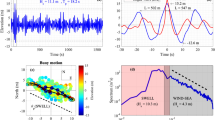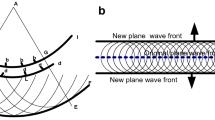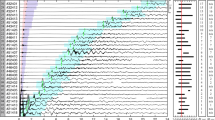Abstract
RAYLEIGH1 was not quite satisfied in having to obtain his equation for speed of wave energy by indirect means, from consideration of 'interference groups'and 'variation in wave-length', and he searched for an alternative method; but the one he devised was also indirect, so that his result still rested on mathematical hypothesis, and was devoid of any obvious explanation. It seems to have remained in this state until Sverdrup and Munk2 recently produced a simple description of what happens to the energy in deep water, and the present purpose is to amplify their description, and show why the speed of the energy of sea waves ranges from a half to the whole of the wave-speed, according to the value of the depth-length ratio, D/L.
This is a preview of subscription content, access via your institution
Access options
Subscribe to this journal
Receive 51 print issues and online access
$199.00 per year
only $3.90 per issue
Buy this article
- Purchase on Springer Link
- Instant access to full article PDF
Prices may be subject to local taxes which are calculated during checkout
Similar content being viewed by others
References
Rayleigh, "Scientific Papers", 1, 325; "On Progressive Waves" (1877).
Sverdrup and Munk, "Wind, Sea and Swell", Pub. 601, 7 (Hydrographic Office, U.S.N., 1947).
"The Civil Engineer in War", 2, 256 (Inst. Civ. Eng., 1948).
Author information
Authors and Affiliations
Rights and permissions
About this article
Cite this article
UNNA, P. Speed of Wave Energy. Nature 164, 887–888 (1949). https://doi.org/10.1038/164887a0
Issue Date:
DOI: https://doi.org/10.1038/164887a0
Comments
By submitting a comment you agree to abide by our Terms and Community Guidelines. If you find something abusive or that does not comply with our terms or guidelines please flag it as inappropriate.



